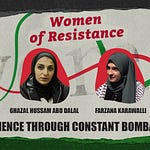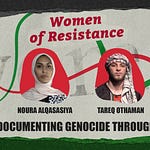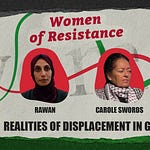“Why do they kill our children?”
This is the question Insaf Awad returns to, again and again, in this sixth episode of Women of Resistance. A mother of five and a special education teacher in Gaza, Insaf speaks with unwavering clarity about what it means to raise a generation under siege—and to fight for their future with nothing but pencils, prayers, and the will to carry on.
Presented by Sakina Datoo and joined in studio by theatre director Jonathan Chadwick, this episode cuts through the false narratives. Insaf doesn’t just describe the horror that came after October 7—she exposes the lifelong suffocation that defined Gaza even before it.
“The occupation shaped our lives,” she says. “Psychologically. Physically. At every stage.”
From the beating of her brother by Israeli soldiers when he was just seven, to the struggles of attending university through checkpoints and closures, her life is a testament to resistance through learning. And now, amid genocide, she continues to teach. Arabic, English and Maths. The bare minimum. Art, history, science—all gone.
“How will our children understand who they are if they’re not allowed to know their own land?” she asks.
Despite the war, Insaf continues to teach with whatever she has. The children lack electricity, food, and often even homes—but she refuses to let them lose education too. She shields herself from despair by avoiding the news entirely, relying instead on word of mouth, living moment to moment.
But she cannot shield herself from the pain.
Her sister was martyred. Her sister’s children were pulled from under the rubble.
“The children cry at night,” she says. “They call out for their mothers. But their mothers are gone.”
Studio guest Jonathan Chadwick brings a stark perspective.
“To destroy a people, you must erase their future. That’s why the children are being targeted. It’s not accidental—it’s policy.”
He calls it what it is: genocide, theft, and a project of erasure.
“Our voice is weak,” Insaf says. “We need the world to carry it for us. To say: we are a people. We have rights.”
Her message is not one of hopelessness. It is a plea—for solidarity, for pressure, for truth-telling. Because even as homes are turned to dust and lives reduced to rubble, Insaf teaches. She endures.
And in Gaza, that is resistance.









